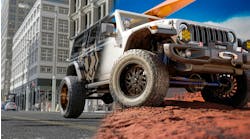As electric vehicles continue to become more popular in North America, Michelin CEO Alexis Garcin says consumers will need to learn that tires are “the most important range-extending feature of an electric vehicle.” And he says independent tire dealers will play a critical role in educating consumers on that front.
Garcin, the president and CEO of Michelin North America Inc., spoke to reporters Feb. 2 during an online briefing, and he talked about three key pillars to the tiremaker’s business: its people, profit and focus on the planet through sustainability efforts.
Much of the commentary focused on the company’s work tied to electric vehicles. Garcin pointed to Michelin’s role in new technologies in history – the creation of the radial tire in 1946 and the company’s first green, fuel-efficiency-focused tire in 1992. He noted that last year Michelin unveiled the Pilot Sport EV, a tire the company says is capable of extending an EV’s range by up to 37 miles while also reducing noise levels by 20%.
“That’s a way to contribute to better mobility but also make (the) tire an even more important piece (of) the car than it is today,” Garcin said.
Garcin says the extra weight of EVs along with their increased torque puts more pressure on the tires. “We can see today that some tires might wear up to 20% faster.
“That’s why bringing technologies to the market and educating consumers can help the market moving forward, while maximizing the performance of the tire (and) increasing the range of the car without sacrificing wear.
“And that’s a game-changing situation for us because that will leverage all the know-how of the last decades.”
So far, consumers are blind to the technology in those tires. A survey in the fall of 2022 conducted on behalf of Michelin indicated 83% of U.S. drivers aren’t sure of what kind of tire an EV needs. The same survey showed 52% of existing EV owners didn’t know what kind of tire their vehicle needed either.
(The survey also showed affordability (59%), range anxiety (43%) and how to charge the vehicle at home (37%) are the top EV-related concerns for internal combustion engine vehicle owners.
Garcin says Michelin believes tire technologies are inseparable from car technologies and that the tiremaker will play a role in software-defined vehicles. He says eight out of 10 EVs use Michelin tires. (In the fine print, Michelin makes that claim based on its tire sales to electric vehicle manufacturers with annual sales projections of at least 1,000 vehicles in the U.S. and Canada.)
The tiremaker began investing in RFID technology a decade ago, and Garcin says by 2024 “all of our tires will be equipped with RFID” so the company can further integrate its tires with automakers’ platforms.
“We believe there is an opportunity that we’re already working at with several OEMs to make sure that we can provide a complete seamless tire experience…and provide consumers with much more predictive information instead of reactive information.”
That might be in automated messages to alert drivers that it’s time to rotate their vehicle’s tires. It could also come in the form of studying a driver’s behaviors and recommending a different tire for a different kind of driving experience, Garcin said.
Even with that connected technology, Garcin said Michelin will continue to rely on its network of dealers.
“We have a very clear strategy in North America to rely on partners to service customers. That’s something that is very close to my heart and how we operate our business.
Garcin said tire dealers will continue to be needed “to educate consumers that all tires are not the same.” At the same time, tire dealers can provide additional services to consumers and “enrich the experience for the end users.
“That’s why I mentioned connectivity. We could have those partners embedded into these connected offers. Think of all the services around the tire management, the tire maintenance. They are really part of our strategy. We don’t want to operate the service ourselves. That’s why we have those partnerships in place.”




